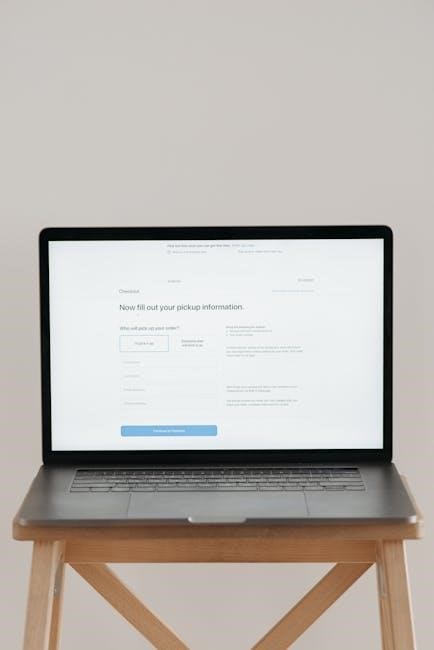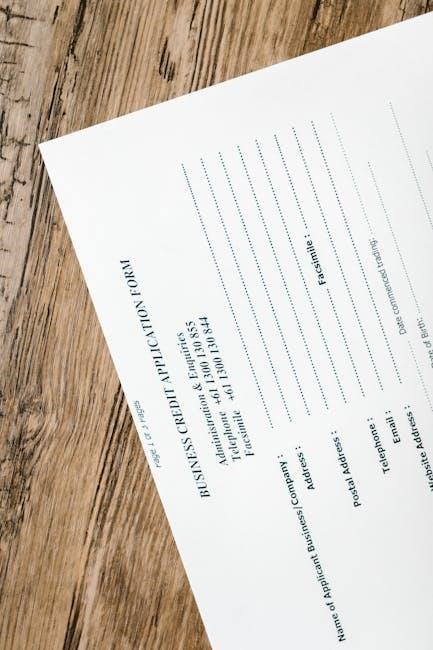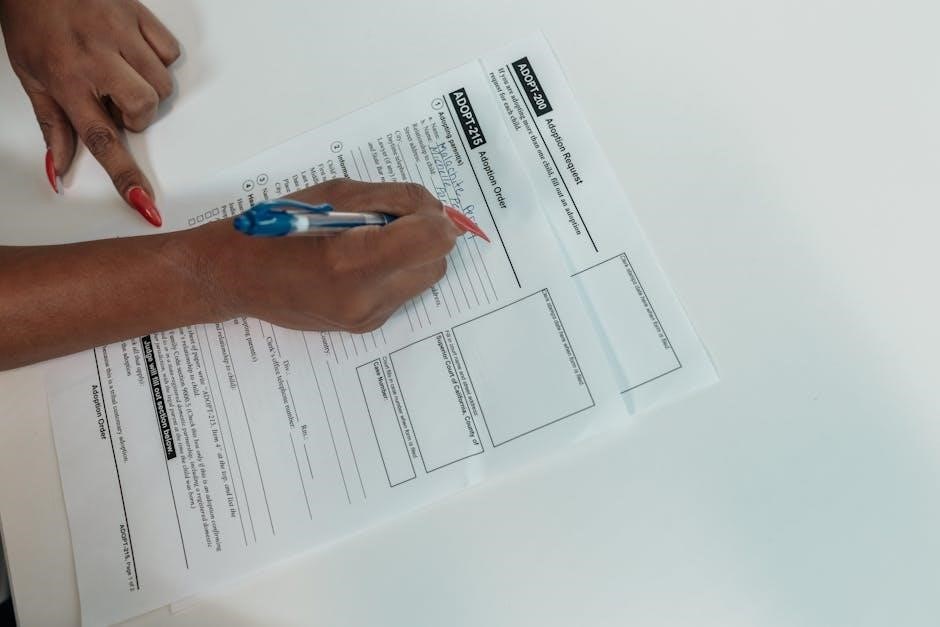british columbia rental application form
Summary
Download the British Columbia rental application form easily. Get your free template now and streamline your rental process!

The British Columbia Rental Application Form is a crucial document for tenants seeking housing. It collects personal‚ financial‚ and rental history details‚ ensuring landlords can assess applicants fairly while complying with local laws and privacy regulations. Understanding its structure and requirements helps tenants prepare accurately and landlords screen responsibly. This form is essential for a smooth rental process in BC.
Overview of the Rental Application Process in British Columbia
The rental application process in British Columbia is designed to ensure fairness and transparency for both tenants and landlords. Prospective tenants typically submit a completed rental application form‚ which includes personal‚ financial‚ and rental history information. Landlords use this data to evaluate applicants’ suitability for the property. The process often involves verifying employment‚ income‚ and references‚ as well as reviewing credit history. Landlords must comply with privacy laws and avoid asking prohibited questions. Once applications are reviewed‚ selected tenants enter into a Residential Tenancy Agreement‚ outlining terms like rent‚ lease duration‚ and responsibilities. This structured process helps ensure a smooth transition for all parties involved.

Importance of Understanding the Rental Application Form
Understanding the British Columbia Rental Application Form is crucial for both tenants and landlords to ensure a fair and transparent rental process. For tenants‚ it provides clarity on the information required and helps them prepare necessary documents‚ reducing delays. Landlords benefit by ensuring compliance with legal standards‚ avoiding potential disputes‚ and selecting suitable tenants. The form also protects tenants’ rights by preventing inappropriate or illegal questions. Misunderstandings about the application process can lead to legal issues or rental denials. Therefore‚ familiarity with the form is essential for a smooth and successful rental experience in British Columbia.
Key Elements of the British Columbia Rental Application Form
The British Columbia Rental Application Form includes essential sections designed to assess a tenant’s suitability. Personal information such as name‚ contact details‚ and identification is required. Employment and financial details‚ like income verification and job history‚ help evaluate stability. Rental history‚ including past landlords and references‚ provides insight into tenancy behavior. Additional documentation‚ such as proof of employment or bank statements‚ may be requested. The form also outlines legal obligations and tenant rights‚ ensuring transparency. Understanding these elements helps tenants prepare accurate information and landlords conduct fair evaluations‚ fostering a smooth rental process in British Columbia.

Legal Requirements and Compliance
British Columbia’s rental application process must comply with provincial laws‚ including the Residential Tenancy Act and privacy regulations‚ ensuring landlords ask only legally permitted questions and maintain tenant rights.
Understanding the Residential Tenancy Agreement (RTA)
The Residential Tenancy Agreement (RTA)‚ also known as a tenancy agreement‚ outlines the terms and conditions for renting a property in British Columbia. It can be either a fixed-term tenancy for a specific period or a month-to-month agreement. The RTA must include details such as rent amount‚ payment terms‚ and the responsibilities of both the landlord and tenant. It’s a legally binding contract that protects both parties by clarifying expectations and obligations. Tenants should review the RTA carefully before signing to ensure they understand their rights and commitments. Landlords are also required to provide a copy of the signed agreement to the tenant within 21 days of the tenancy start date.
Landlord and Tenant Rights in British Columbia
In British Columbia‚ both landlords and tenants have specific rights protected under the Residential Tenancy Act. Landlords have the right to collect rent‚ maintain their property‚ and enforce lease terms. Tenants‚ on the other hand‚ are entitled to quiet enjoyment of the property‚ privacy‚ and timely repairs. Landlords must provide a safe and habitable living space‚ while tenants must pay rent on time and maintain the unit. Both parties are expected to fulfill their obligations as outlined in the tenancy agreement. Understanding these rights ensures a balanced and respectful relationship‚ preventing disputes and ensuring compliance with provincial rental laws. The Residential Tenancy Act serves as the foundation for these rights‚ safeguarding the interests of both landlords and tenants alike.
Privacy Laws and What Landlords Can Ask For
In British Columbia‚ privacy laws strictly regulate what landlords can request on a rental application. Landlords must avoid asking for unnecessary personal information‚ such as medical history‚ marital status‚ or sexual orientation‚ as these are protected under human rights and privacy laws. They can‚ however‚ request relevant details like proof of income‚ employment verification‚ rental history‚ and references to assess a tenant’s suitability. Landlords must ensure all requested information is directly related to the tenancy and necessary for evaluating the application. This balance protects both the landlord’s right to screen applicants and the tenant’s right to privacy‚ ensuring compliance with BC’s privacy laws and fair housing practices. Tenants should be cautious about sharing excessive personal data and understand their rights in this process.
Prohibited Questions on Rental Applications
In British Columbia‚ landlords are legally restricted from asking certain questions on rental applications to ensure fairness and compliance with human rights laws. Questions about race‚ ethnicity‚ national origin‚ religion‚ gender identity‚ sexual orientation‚ age‚ marital status‚ or family composition are strictly prohibited. Additionally‚ landlords cannot inquire about a tenant’s medical history‚ source of income (e.g.‚ social assistance)‚ or require a co-signer without justification. They also cannot ask about criminal history unless it directly relates to tenancy. These restrictions are enforced under the BC Human Rights Code and the Personal Information Protection Act (PIPA). Tenants should be aware of their rights to avoid discrimination and ensure their personal information is protected during the application process.

What to Expect on the Rental Application Form
A British Columbia rental application typically includes sections for personal information‚ employment details‚ rental history‚ and references. Applicants must provide accurate‚ honest disclosure to facilitate a fair assessment.
Personal Information Required
On a British Columbia rental application‚ applicants typically provide personal details such as full name‚ date of birth‚ contact information‚ and identification numbers like a Social Insurance Number or passport. Landlords may also request proof of legal status in Canada‚ such as a visa or citizenship documents. Additionally‚ applicants are often asked for emergency contact information and their current and previous addresses. This information helps landlords verify identity and assess suitability as a tenant. It’s important to ensure all details are accurate‚ as false information can lead to application denial. BC privacy laws regulate what landlords can request‚ ensuring personal data is collected responsibly and used solely for tenant screening purposes.
Employment and Financial Information
The British Columbia rental application form requires applicants to provide employment and financial details to assess their ability to pay rent. This typically includes proof of income‚ such as a recent pay stub or a job offer letter‚ and employment verification‚ like contact information for an employer. Applicants may also need to submit bank statements or proof of savings to demonstrate financial stability. In some cases‚ landlords may request tax returns or other financial documents to verify income consistency. This information helps landlords evaluate whether an applicant can afford the rent and meet their financial obligations. It’s important for tenants to ensure the information is accurate and compliant with privacy laws‚ as landlords are limited in what they can request under BC regulations.
Rental History and References
Rental History and References
The British Columbia rental application form often includes a section for rental history and references. Applicants are typically asked to provide contact information for previous landlords or property managers to verify their tenancy record. This helps landlords assess the applicant’s reliability and responsibility as a tenant. Additionally‚ personal references‚ such as from employers‚ colleagues‚ or acquaintances‚ may be requested to further evaluate the applicant’s character and trustworthiness. Providing accurate and positive references is crucial‚ as negative or unverifiable information could impact the landlord’s decision. Tenants should ensure they have reliable references and are prepared to explain any gaps or issues in their rental history. This section is designed to help landlords make an informed decision while ensuring fairness and compliance with tenancy laws in British Columbia.
Additional Documentation Needed
When completing a British Columbia rental application form‚ applicants may need to provide additional documentation to support their application. Commonly requested documents include proof of income‚ such as pay stubs or an employment letter‚ and bank statements to verify financial stability. Identification‚ like a passport or driver’s license‚ may also be required to confirm identity. Some landlords request references from previous landlords or employers to assess reliability. In some cases‚ applicants may need to provide a co-signer’s information if their income is insufficient. It’s important to prepare these documents in advance to avoid delays in the application process. Ensuring all requested materials are submitted promptly can improve the likelihood of a successful application. Proper documentation helps landlords make informed decisions while maintaining fairness and transparency in the rental process.

The Application Process
The British Columbia rental application process involves obtaining the form‚ filling it out accurately‚ submitting required documents‚ and waiting for processing. Landlords review applications thoroughly before approval.
How to Obtain a Rental Application Form
To obtain a British Columbia Rental Application Form‚ tenants can request it directly from landlords or property managers. Many landlords use the official Residential Tenancy Agreement (RTA) form‚ which can also be downloaded from the British Columbia government website. Additionally‚ legal aid websites and property management companies provide downloadable templates. Some landlords may use online platforms that offer paid services to fill out and manage rental applications. It’s essential to ensure the form complies with BC rental laws and includes necessary sections for personal‚ financial‚ and rental history information. Tenants should always verify the form’s authenticity before submitting their details to avoid potential issues.
Step-by-Step Guide to Filling Out the Form
Filling out the British Columbia Rental Application Form requires careful attention to detail. Start by reviewing the form to understand all required sections. Begin with personal information‚ including your full name‚ contact details‚ and identification numbers; Next‚ provide employment and financial details‚ such as your job title‚ employer‚ income‚ and bank account information. Include rental history with previous landlords’ contact information. Attach references from employers‚ landlords‚ or character references. Ensure all documentation‚ like proof of income and rental history‚ is complete and accurate. Review the form for errors before submitting it to the landlord or property manager. This ensures a smooth and professional application process.
Submitting the Application and Required Documents
Once the form is completed‚ submit it along with all required documents to the landlord or property manager. Ensure all sections are filled accurately and legibly. Attach proof of income‚ employment letters‚ rental history‚ and references. Include a valid government-issued ID and any additional documentation requested. Submit the application in person‚ via email‚ or through an online portal‚ depending on the landlord’s preference. Keep copies of all submitted documents for your records. After submission‚ the landlord will review your application and may contact your references. Processing times vary‚ but you can follow up to inquire about the status. A completed application with all necessary documents increases your chances of approval.
Processing Time and What to Expect Next
After submitting your rental application‚ the processing time typically ranges from a few days to a week‚ depending on the landlord’s workload and the complexity of your application. During this period‚ the landlord will review your documents‚ verify your references‚ and assess your suitability as a tenant. If additional information is needed‚ the landlord may contact you for clarification. Once processed‚ you will receive notification of approval‚ rejection‚ or a request for further details. If approved‚ you will be invited to sign the tenancy agreement and pay the security deposit. Ensure you understand the terms before signing. If rejected‚ you may request feedback to improve future applications. Stay proactive and follow up if you haven’t received updates within the expected timeframe.

Legal Considerations
The British Columbia rental application process must comply with provincial tenancy laws‚ ensuring fairness and privacy. Landlords must avoid discriminatory practices and adhere to legal guidelines when screening applicants. Understand your rights and responsibilities to navigate the process smoothly and avoid potential disputes. Compliance with the Residential Tenancy Act is essential for both tenants and landlords. Stay informed about legal updates to ensure a lawful rental experience in British Columbia.
Grounds for Denial of a Rental Application
A rental application in British Columbia may be denied for several reasons‚ including poor rental history‚ insufficient income‚ or negative references. Landlords can also deny based on past violations of tenancy agreements‚ such as illegal activities‚ property damage‚ or repeated late payments. Additionally‚ if an applicant fails to provide required documentation or provides false information‚ the landlord has grounds to reject the application. Eviction history or outstanding debts to previous landlords are also valid reasons for denial. However‚ landlords must comply with anti-discrimination laws and cannot deny based on race‚ gender‚ or other protected characteristics. Understanding these criteria helps applicants avoid common pitfalls and improve their chances of approval. Tenants have rights‚ but landlords also need assurance of responsible tenancy. Balancing these factors ensures a fair process for both parties.
Discrimination and Fair Housing Practices
In British Columbia‚ landlords must adhere to fair housing practices and avoid discrimination when reviewing rental applications. The Human Rights Code prohibits discrimination based on race‚ gender‚ age‚ disability‚ religion‚ or family status. Landlords cannot refuse housing due to these protected characteristics. They must ensure their screening processes are fair and unbiased‚ focusing on legitimate criteria such as income‚ rental history‚ and creditworthiness. Tenants who believe they have been unfairly denied housing can file a complaint with the British Columbia Human Rights Tribunal. Landlords are also required to comply with privacy laws‚ ensuring personal information is collected and used responsibly. Fair housing practices promote equality and protect tenants from unjust treatment during the rental application process. Understanding these rights and responsibilities helps maintain a fair and respectful rental market in BC.
Security Deposits and Legal Limits
In British Columbia‚ landlords can require a security deposit‚ but it is capped at one month’s rent. This deposit is held to cover potential damages‚ unpaid rent‚ or cleaning costs. Tenants must receive their security deposit back within 15 days of moving out‚ provided the rental unit is in good condition and all rent is paid. Landlords must pay interest on the deposit if it is held for more than one year. Importantly‚ landlords cannot demand more than the legal limit‚ and tenants have legal recourse if their deposit is unfairly withheld. Understanding these rules ensures both parties comply with provincial regulations and protects tenants from excessive financial demands. Clear communication and documentation are key to resolving any disputes. Security deposits are a standard part of renting in BC‚ but they must be handled fairly and lawfully.
Eviction Notices and Tenant Rights
In British Columbia‚ landlords must follow strict legal procedures when issuing eviction notices. Tenants have the right to receive proper notice‚ which varies based on the reason for eviction. For non-payment of rent‚ landlords can serve a 10-Day Notice to End Tenancy. Other breaches‚ like violating terms of the tenancy agreement or engaging in illegal activities‚ require a 1-Month Notice. Tenants can dispute eviction notices through the Residential Tenancy Branch (RTB). It is illegal for landlords to evict tenants without following these procedures. Tenants also have the right to quiet enjoyment of the property and cannot be locked out or forced to leave without a valid court order. Understanding these rights ensures tenants are protected from unfair eviction practices and can seek legal recourse if necessary. Proper documentation and communication are essential in resolving disputes fairly.

Tips for Tenants
Research properties thoroughly‚ understand your rights‚ and ensure all application details are accurate. Gather references‚ review agreements carefully‚ and maintain open communication with landlords to avoid disputes.
How to Stand Out as a Strong Applicant
To stand out as a strong applicant‚ ensure your rental application is complete and well-organized. Highlight stable employment‚ a solid rental history‚ and a good credit score. Provide clear‚ professional references and proof of income. Be prepared to act quickly in BC’s competitive rental market. Presenting a positive‚ responsible image increases your chances of approval. Avoid delays by having all necessary documents ready. Accurately completing the application and being transparent about past issues can build trust with landlords. Following up politely after submission demonstrates your interest and reliability. By showcasing financial stability and respect for tenancy agreements‚ you position yourself as an ideal tenant in British Columbia’s competitive housing landscape.
Understanding Your Rights as a Tenant
As a tenant in British Columbia‚ it’s crucial to understand your rights under the Residential Tenancy Act (RTA). You have the right to a safe and habitable living space‚ and landlords cannot unfairly evict you or violate your privacy without proper notice. Security deposits are capped at one month’s rent and must be returned with interest when you move out‚ provided you fulfill your tenancy obligations. Additionally‚ landlords must provide written notice for rent increases or evictions‚ adhering to legal timelines. Familiarizing yourself with the RTA ensures you can advocate for your rights and recognize unlawful practices. Knowing your rights empowers you to navigate disputes confidently and seek support from the Residential Tenancy Branch if needed.
What to Look for in a Tenancy Agreement
When reviewing a tenancy agreement in British Columbia‚ ensure it clearly outlines the rent amount‚ payment terms‚ and duration of the tenancy. Verify if it’s a fixed-term or month-to-month agreement‚ as each has different implications. Check for specific rules‚ such as pet policies or guest restrictions. Be wary of prohibited clauses that may violate your rights under the Residential Tenancy Act (RTA). The agreement should be in writing‚ signed by both you and the landlord‚ with each party retaining a copy. Understand that any amendments must be mutually agreed upon in writing. Familiarize yourself with the RTA and seek assistance from the Residential Tenancy Branch if needed to ensure your rights are protected.
Documents to Keep for Your Records
When renting in British Columbia‚ it’s essential to maintain organized records to protect your rights and interests. Keep a copy of the signed tenancy agreement‚ as it outlines the terms of your rental. Save all correspondence with your landlord‚ including emails‚ letters‚ or texts‚ especially those related to repairs‚ rent increases‚ or notices. Store receipts for rent payments‚ security deposits‚ and any other fees paid. Take dated photos of the property before moving in and after moving out to document its condition. Retain records of any maintenance requests and their outcomes. Keep copies of eviction notices‚ if applicable‚ and any legal documents related to your tenancy. Organize financial records‚ such as proof of income or employment‚ as they may be needed for future reference. Finally‚ maintain a record of the property’s condition when you move in and out to avoid disputes over damages or repairs.

Landlord Responsibilities
As a tenant in British Columbia‚ it’s crucial to keep copies of your rental application‚ signed tenancy agreement‚ and any correspondence with your landlord. Maintain records of rent payments‚ security deposits‚ and repair requests. Document the property’s condition with photos taken before moving in and after moving out. Keep receipts for any fees paid and store all legal notices‚ such as eviction notices‚ if received. Organize financial records‚ like proof of income‚ and ensure you have a copy of the Residential Tenancy Agreement (RTA). These records will help protect your rights and provide clarity in case of disputes.
Screening Tenants Responsibly
Landlords in British Columbia must conduct tenant screening ethically and lawfully. They should only request information directly related to the tenancy‚ avoiding prohibited questions about race‚ religion‚ or family status. It’s essential to comply with privacy laws‚ ensuring personal data is handled securely. Landlords should assess applicants based on financial stability‚ rental history‚ and references. They must avoid discrimination and ensure equal opportunity for all applicants. Additionally‚ landlords should maintain transparency about their screening criteria and processes. This responsible approach fosters trust and ensures fair treatment of potential tenants while safeguarding the landlord’s interests. Proper screening helps build a positive landlord-tenant relationship and reduces potential disputes.
Ensuring Compliance with Rental Laws
Landlords in British Columbia must adhere to the Residential Tenancy Act (RTA) and related regulations when processing rental applications. This includes complying with privacy laws‚ such as the Personal Information Protection Act‚ which restricts the types of information landlords can request. They must avoid asking prohibited questions that violate human rights‚ such as inquiries about marital status or nationality. Additionally‚ landlords must respect rules regarding security deposits‚ eviction notices‚ and tenancy agreements. Staying informed about updates to rental laws is crucial to avoid legal penalties. By ensuring compliance‚ landlords can maintain a lawful and fair rental process‚ protecting both their rights and those of their tenants. Proper adherence to these laws fosters a balanced and respectful landlord-tenant relationship.
Maintaining a Positive Landlord-Tenant Relationship
Maintaining a positive landlord-tenant relationship in British Columbia requires clear communication‚ mutual respect‚ and adherence to legal standards. Landlords should ensure that tenants understand their responsibilities while respecting their privacy and rights. Regular updates on property maintenance and timely responses to repairs foster trust. Providing written notice before entering the rental unit demonstrates respect for tenants’ privacy. Being approachable and open to addressing concerns can prevent disputes. Fair treatment of all tenants‚ avoiding discrimination‚ and following rental laws are essential. By creating a respectful and transparent environment‚ landlords can build long-term‚ positive relationships with their tenants‚ ensuring a harmonious living situation for all parties involved.
Handling Security Deposits Correctly
Handling security deposits correctly is essential for landlords in British Columbia to comply with tenancy laws. A security deposit cannot exceed one month’s rent and must be returned to the tenant after the tenancy ends‚ minus any lawful deductions. Landlords must provide a written agreement outlining the deposit terms. If deductions are made‚ an itemized list of charges must be given to the tenant. Failure to handle deposits properly can result in legal consequences‚ including penalties. Proper management ensures fairness and protects both parties’ interests‚ fostering a positive landlord-tenant relationship. Understanding and adhering to these rules is crucial for landlords to avoid disputes and maintain compliance with BC rental regulations.

Additional Resources

Explore government websites‚ tenant union links‚ and legal aid resources for guidance on rental applications. Community organizations and online tools like RentCheck and Lease Builder also provide valuable assistance.
Where to Find Help with Rental Applications
For assistance with rental applications in British Columbia‚ tenants can access various resources. The BC government website offers detailed guides and downloadable forms. Tenant unions and legal aid societies provide free advice and workshops. Community organizations‚ such as non-profits‚ often assist with application preparation‚ especially for new immigrants or low-income applicants. Online platforms like RentCheck and Lease Builder offer tools to streamline the process. Local libraries and municipal offices may also provide access to resources and referrals. These services ensure tenants understand their rights and responsibilities‚ helping them navigate the rental application process effectively and confidently.
Government Resources for Tenants and Landlords
In British Columbia‚ both tenants and landlords can access government resources to navigate the rental process. The official BC government website provides detailed guides‚ including the Residential Tenancy Agreement (RTB-1) form‚ which outlines legal requirements for tenancies. Additionally‚ the BC Housing website offers resources on tenant and landlord rights‚ dispute resolution‚ and rental laws. The government also provides tools like RentCheck and Lease Builder to help manage rental agreements. These resources ensure compliance with provincial regulations and offer support for resolving disputes. They are essential for understanding responsibilities and maintaining fair tenancy practices in BC.
Community Organizations and Support Services
Several community organizations in British Columbia provide support for tenants and landlords navigating the rental application process. Groups like the Tenant Resource & Advisory Centre (TRAC) and the BC Housing website offer free resources‚ including guides on rental applications and tenancy agreements. Non-profit organizations such as NewToBC assist immigrants with housing-related challenges‚ while local housing societies provide counseling and workshops on tenant rights. Additionally‚ services like the BC Rent Bank offer financial assistance to tenants facing eviction. These organizations bridge gaps in housing support‚ ensuring equitable access to rental opportunities and fostering fair housing practices across the province.
Online Tools for Managing Rentals
Online tools have simplified the rental application process in British Columbia‚ offering efficient solutions for both tenants and landlords; Platforms like RentCafe and Zillow provide comprehensive listings‚ enabling tenants to search and apply for properties digitally. Tools such as PadMapper and Realtor.ca allow users to filter listings based on specific criteria‚ streamlining the search process. Additionally‚ services like Tenantify offer digital rental applications‚ reducing paperwork and speeding up approvals. Landlords can utilize property management software like Yardi or AppFolio to manage applications‚ screen tenants‚ and track communications. These tools enhance transparency‚ organization‚ and accessibility‚ making the rental process more efficient and user-friendly for everyone involved in British Columbia.